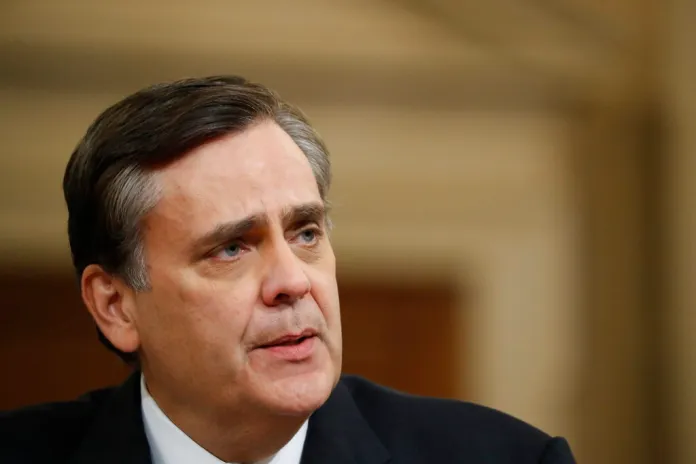


During a debate at the Virginia Military Institute on Tuesday, two law professors were asked about a charge that has become a frequent refrain among Democrats despite a flurry of strong legal victories for the Trump administration this year: Is the United States in a constitutional crisis under President Donald Trump?
The Steamboat Institute’s debate resolution, “Be it resolved, the U.S. is experiencing a constitutional crisis,” featured Boston College law professor Daniel Farbman in support and Jonathan Turley, the J.B. and Maurice C. Shapiro professor of public interest law at George Washington University, in opposition. Steamboat Institute Tony Blankley Fellow Kaylee McGhee White moderated.
Recommended Stories
- Pennsylvania GOP defectors push gun control bill across finish line in state House
- Hawley presses witness on ‘two-spirit people’ during testy Senate hearing
- DOJ sues LA over 'unreasonable' gun permit delays

Turley rejected the premise outright.
“We are not in a constitutional crisis. We’re in a crisis of faith,” he said, noting that courts have ruled “against President Trump when he’s wrong … and for him when he’s been right.” He added that Congress completed its constitutional duties after Jan. 6 by certifying the election.
“Don’t confuse a crisis of faith with a constitutional crisis,” he said.
The sharpest divide between Turley and Farbman on Tuesday was definitional, with the idea of crisis as a collapse versus crisis as an inflection point. Turley contended that James Madison’s system remains intact.
“The greatest testament,” Turley said, “is we’re still here — and still talking.”
Farbman, who signed a letter with over 1,000 scholars in February declaring the nation in a constitutional crisis, argued that a full collapse of the rule of law need not occur before the nation finds itself in a crisis.
“A constitutional crisis can be a moment in which our constitution is transforming,” he said, citing Reconstruction, the New Deal, and the Civil Rights era as examples. He argued that threats to deploy federal forces in cities, even if later blocked by courts, cast a “constitutional shadow” that has chilled governance and civic life.
The debate unfolded against the backdrop of Democrats who are increasingly framing Trump’s second-term clashes, whether in the courts or when his Justice Department officials’ motivations are questioned, as a constitutional emergency.
After former FBI Director James Comey’s recent indictment on false statement and obstruction charges, Sen. Chris Murphy (D‑CT) declared on X, “We aren’t on a slippery slope to a constitutional crisis. We are IN the crisis.”
We aren't on a slippery slope to a constitutional crisis. We are IN the crisis. Time for leaders – political leaders, business leaders, civic leaders – to pick a side: democracy or autocracy? https://t.co/c93GIlxbjE
— Chris Murphy ???? (@ChrisMurphyCT) September 25, 2025
Earlier this year, Senate Minority Leader Chuck Schumer (D-NY) told NBC’s Meet the Press that Trump’s attacks on the judiciary have produced a “constitutional crisis,” asserting that Trump “thinks he should be king” and vowing that Democrats “will not impeach judges.” Notably, many Democrats, including Murphy and Schumer, issued statements in response to Trump’s criminal indictments prior to his reelection that “no one is above the law.”
Turley pushed back on the idea that legal conflicts under Trump have amounted to a breakdown of the system, arguing instead that critics often conflate sharp political disagreement with structural dysfunction.
“There’s a dangerous conceit that every generation has — that your problems are so unique, so insurmountable, that you have to change the rules,” he said. “The problem is with us, not with the Constitution.”
Turley criticized what he described as judicial overreach by some lower federal courts, particularly through the use of nationwide injunctions that have blocked administration policies from taking effect.
“Many of them have just been incredibly abusive of their power,” he said, arguing that trial judges have acted “far outside the navigational beacons of Article III.”
However, rather than seeing this as evidence of failure, Turley pointed to the Supreme Court’s willingness to rein in those judges as proof that the system still works.
“They have rendered decisions. They’ve been reversed. That’s how the system works,” he said.
Farbman countered that such judicial interventions are not evidence of runaway courts but a necessary response to sweeping constitutional violations by the executive branch. He argued that when federal policies violate rights on a national scale, district courts are often forced to issue national relief.
“If the practice is a national practice, it has to be a national injunction,” he said.
He also defended judges who take on such cases, often in high-stakes litigation over immigration, civil rights, or executive overreach.
“If you’re the federal judge, and the case comes before you, it’s very clear what the constitutional principles suggest. You can’t just shrug and say, ‘Go ahead.’ You have to answer the question,” Farbman said. He noted that the flood of lawsuits this year is a symptom of a system under strain, and that courts are being overwhelmed by the fallout of aggressive executive action.
One of the strongest arguments against the notion that Trump has caused a constitutional crisis is his rate of success at the Supreme Court since January. A majority has handed Trump 19 victories since he returned to the Oval Office, albeit this count includes several instances in which the administration sought temporary pauses to lower court orders that offered only interim wins before those cases were fully briefed on the merits.
BARRETT SAYS THINKING ABOUT SUPREME COURT AS ‘LEFT AND RIGHT’ IS WRONG
Justice Amy Coney Barrett recently weighed in on the constitutional crisis debate, saying last month during a sit-down with journalist Bari Weiss that “the Constitution is alive and well.”
“I think that our country remains committed to the rule of law. I think we have functioning courts. I think a constitutional crisis — we would clearly be in one if the rule of law crumbles. But that is not the place where we are,” said Barrett, who was appointed by Trump in 2020.
